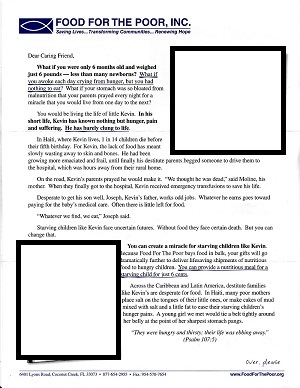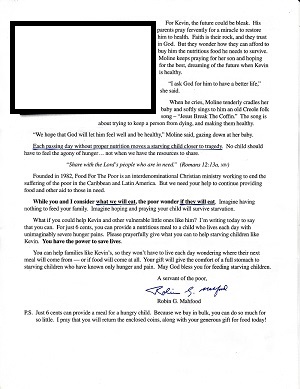The latest religious charity that’s sent me a solicitation is Food for the Poor, Inc., a Christian nonprofit that serves poor and malnourished people in the Caribbean and Latin America. Click to see the letter [NOTE: possibly disturbing images of an emaciated infant]:
As is standard for humanitarian charities, the letter describes the desperate poverty of the people they serve. Given that Haiti was one of the world’s poorest countries even before the 2010 earthquake, I’m willing to believe that stories like these are accurate:
In Haiti, where Kevin lives, 1 in 14 children die before their fifth birthday. For Kevin, the lack of food has meant slowly wasting away to skin and bones. He had been growing more emaciated and frail, until finally his destitute parents begged someone to drive them to the hospital, which was hours away from their rural home.
…For Kevin, the future could be bleak. His parents pray fervently for a miracle to restore him to health. Faith is their rock, and they trust in God. But they wonder how they can afford to buy him the nutritious food he needs to survive.
With letters like these, Food for the Poor makes a strong case for the desperate circumstances of the people they serve. But while they don’t seem to realize it, they’ve put themselves in a theologically awkward position.
The letter touts the steadfast faith of these poor people as a way of appealing to a presumed-Christian audience. At the same time, the letter implies that their faith is futile, because their children will starve to death if other human beings don’t help them.
After all, if this family trusts in God and prays for miracles, why doesn’t he do one to reward their devotion? It’s not as if the Bible doesn’t have examples of this. Why not cause manna to rain from heaven to succor the hungry, or turn stones to bread, or miraculously multiply loaves and fishes so a small meal can feed hundreds of people? Those kinds of miracles happened all the time in the distant past, if the biblical text can be believed. Yet Christian charities like this one ask people for help under the implicit assumption that this doesn’t happen.
These kinds of solicitations display the finely honed apologetic doublethink of religious faith. Just as in the classic Orwellian definition, it’s the ability to hold two mutually contradictory propositions in one’s mind at the same time.
I have no doubt, if you asked them, that Food for the Poor would say they believe that God exists, loves human beings, cares about our suffering, and is willing and able to do miracles on our behalf. Yet they ask people to assist in helping the needy and the suffering just as if none of that were true. (And what about the families themselves? If the god they believe in is the kind of god who would let children suffer and die from malnutrition, is he worth their faith?)
Stories like these show that even religious believers themselves recognize, at some level, how their faith clashes with reason. They recognize that God won’t come through to help the needy. They recognize that all the beatific platitudes of their belief system amount to nothing when it comes to real-world planning. They recognize that human help is the only kind of help we can count on or hope for.
I’ve emphasized this with respect to just one charity, but you can multiply this point by all the examples of religious charities that implore people to dig deep to help the cold, the hungry, the sick, and the deprived. All of them, by their actions, show that they don’t believe what they profess about an interventionist deity. If they did, they’d urge people to pray for divine aid, rather than asking them to send money or to volunteer.

